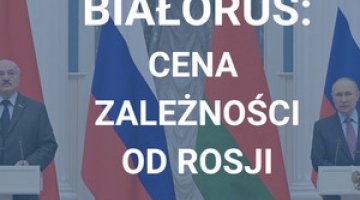The president of Belarus continues repression and strengthens authoritarian system of government
14 May saw the end of the trial of Andrei Sannikau, one of the main opposition candidates in last December’s presidential elections, who was accused of organising mass post-election riots. The government intends the penalties for its opponents to serve as demonstrations of the Belarusian regime’s strength. Lukashenka’s priority remains to retain power and strengthen the authoritarian system, even in the face of of deepening economic problems and increasing need for foreign credits. Continuing the policy of repression against the opposition excludes economic support from the West. At the same time, Minsk is not bowing to Russian demands for the privatisation of key industrial plants; consequently, Moscow is also refusing to grant a stabilisation loan. This leads to self-isolation of Belarus on the international stage. In turn, there is no clear and transparent plan of action in the economic field, which is further deepening the financial crisis. However, the current policy may be only temporary in nature, and it seems that over the coming months the need to raise financial support will force Lukashenka to make concessions to Russia and/or the EU.
The internal context
Andrei Sannikau was sentenced to five years’ imprisonment in a penal colony; this is the harshest sentence passed so far in connection with the post-election demonstration held in the centre of Minsk last 19 December by the regime’s opponents. More than twenty other opposition activists were sentenced to lesser jail terms; some have been given suspended sentences. The trials of the other presidential candidates are still underway, and will also probably end in convictions. By putting the opposition activists on trial, the Belarusian government is demonstrating that regardless of the country’s difficult economic situation (including its urgent need for credit) and sanctions from the EU and the United States, it is determined to maintain the authoritarian system and punish its internal opponents.
In numerous statements, President Lukashenka has insisted on the need to increase social discipline and control, which he sees as the main way to stabilise the situation in the country. This is why procedures were initiated at the end of April to liquidate two independent newspapers, Nasha Niva and Narodnaya Wola, on charges of distributing content that is incompatible with the official government line. At the same time, Lukashenka has ruled out the possibility of economic reforms, despite the suggestions of most economists, including experts from the International Monetary Fund. As a result, the Belarusian government’s current economic policy is based on maintaining the command-economy model, while taking only minimal, short-term corrective actions. Due to a lack of decisive action (including a one-off devaluation), several exchange rates for the local rouble have appeared on the Belarusian market; this has significantly limited the activities of importers and led to a serious deficit of foreign currency in exchange offices. In addition, prices have increased significantly, including those of basic necessities. According to official data, inflation during the period from January to April this year reached 10.9%, which already exceeds the level planned for 2011.
The Russian context
Most likely, the negotiations carried out over the last two months to grant Belarus a Russian stabilisation loan of US$3 billion have ended in failure. Despite an earlier statement on May 11 that the talks had succeeded, the Russian finance minister Aleksei Kudrin announced that Belarus could not count on a loan from the Russian budget, and the only option is a three-year line of credit (amounting to US$1 billion per year) from the Eurasian Economic Community’s Anti-Crisis Fund. It can therefore be assumed that Belarus has failed to meet the conditions Moscow put forward, relating to the sale of Belarusian key idustrial plants to Russian investors, including MAZ (the Minsk automotive company), and the other half of the shares in Bieltransgaz, the Belarusian gas pipeline operator (50% of whose shares already belong to Gazprom). In addition, Minsk did not agree to undertake the key economic reforms which Russia has requested. However, we cannot rule out the possibility that the parties will return to this issue during a visit scheduled for 19 May by Russian Prime Minister Vladimir Putin to Minsk, in connection with the meeting of the heads of governments of Russia, Belarus and Kazakhstan within the framework of the Customs Union, and of the Council of Heads of Governments of the Commonwealth of Independent States. At the same time, the Russian side is suggesting increasingly openly that the Belarusian government could obtain financial support by privatising Belarusian companies.
The EU context
The court sentences, including sentencing one opposition leader to 5 years in a penal colony, will worsen Belarus’s relationship with the EU even more. The EU has made a return to dialogue with Minsk and the possible start of cooperation programmes conditional on an end to repression and the release of all political prisoners. In this situation, some of the member states will require the visa sanctions which have been in operation for the last few months to be reinforced by economic sanctions. One of the topics scheduled for the EU foreign ministers’ meeting on 23 May will be the question of sanctions against specific Belarusian enterprises controlled by Lukashenka’s inner circle, which provide a source of income for the regime. It also seems unlikely in this situation that the International Monetary Fund will issue Belarus a stabilisation loan, although its delegation in Minsk has still not yet officially ruled out further loans to that country. In addition, Belarus’ participation in the Eastern Partnership will continue to besignificantly limited.
Conclusions
Alyaksandr Lukashenka is currently implementing a policy of strengthening his control over society, victimising the opposition further and maintaining the command-economy system. In addition, fearing the weakening of the system he has created, he refuses to accede to the demands of both Moscow and Brussels, which is leading to international isolation of Belarus. At the same time, the Belarusian government has accused the European Union of taking an obstructive approach towards Belarus, and has suggested taking more appropriate action. In the economic sphere, the authorities are passing the costs of the crisis on to the general public, hoping that they will be able to compensate for the rising cost of living by cultivating their private suburban allotments, which are popular in Belarus. It is also possible that the scale of the crisis has surprised and disoriented Lukashenka, as a result of which he is finding it hard to take decisions on reforming the financial market. At the same time, the Belarusian president is still hoping that despite his refusal to make concessions, he will receive support from Russia.
However, the current policy of maintaining the system may not be effective in the long term, and will therefore be only temporary in nature. According to the calculations of independent Belarusian economists, the country needs up to US$10 billion in the near term to stabilise its finances. Hence the need to obtain foreign credits will force Lukashenka to make concessions to Russia and/or the West. Therefore, in the coming months, Minsk will probably try to use the imprisoned opposition leaders as bargaining chips in its talks with Brussels. At the same time, there is nothing to indicate that Lukashenka is ready for any real democratisation. On the other hand, in its relations with Russia, Minsk will likely revert to the question of admitting Russian capital into those strategic enterprises which are currently state-owned. It seems that the Belarusian government is aiming to renew its policy carried out for years of tacking between Russia and the EU. Now, however, Belarus has much less room for manoeuvre, and the EU has relatively little chance to make an impact; Minsk will thus become increasingly dependent on Moscow.





